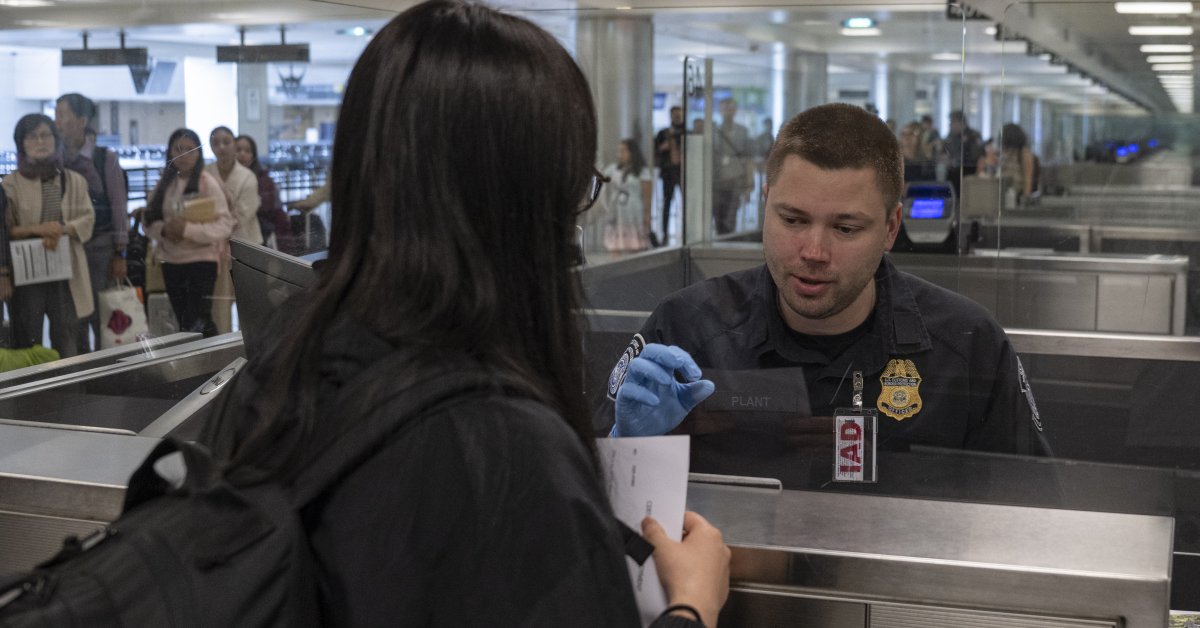Travelling to the U.S. is becoming not only more cumbersome, but also more costly, under the second Trump Administration.
On top of a slew of charges it already intends to levy on U.S. visitors, the State Department plans to roll out a year-long visa bond pilot program which will require certain business and tourist visa applicants to post bonds of up to $15,000 as a condition of the visa issuance.
The visa bond program is a revival of a program from the first Trump Administration, which required nationalities from 23 different countries—most of which are in Africa—to post similar bonds. That program, announced in late 2020, had a six-month timeline but the department did not fully implement it because the COVID-19 pandemic caused an international travel slowdown, according to a government notice on the Federal Register Tuesday.
The second Trump Administration’s visa bond pilot program is set to take effect on Aug. 20. It’s intended “to protect America’s borders and the American people by holding foreign visitors accountable for departing the United States on time,” according to a cable that The Washington Post obtained which bore the signature of Secretary of State Marco Rubio.
Read More: What to Know About New Social Media Screening Rules for Student Visas
It’s the latest tightening of visa application measures, as part of the Administration’s strict immigration agenda. In late July, the State Department announced that it will require almost all nonimmigrant visa applicants to attend in-person interviews.
Here’s what to know about the visa bond program:
Which travellers have to post visa bonds?
The notice did not specifically mention particular countries. But it said that the department will announce the countries via the website travel.state.gov no less than 15 days before the program takes effect with a “brief explanation of the basis for requiring bonds.” The department also stipulated that the list of countries may be amended throughout the pilot.
The countries “will be identified based on high overstay rates, screening and vetting deficiencies, concerns regarding acquisition of citizenship by investment without a residency requirement, and foreign policy considerations,” a State Department spokesperson is quoted as telling Reuters.
The notice said it will determine the countries with the highest overstay rates based on a 2023 Department of Homeland Security report. Several countries in Africa, as well as Haiti, Laos, Myanmar, and Yemen recorded the highest overstay rates for those visiting for business or tourism, per that report. Many of the countries with those high overstay rates also are part of Trump’s travel ban.
Citizens of the 42 countries and territories enrolled in the Visa Waiver Program would not have to post a bond. The VWP enables travel to the U.S. for business or tourism for up to 90 days without the need for a visa.
The State Department has estimated that the number of visa applicants that fall under the pilot program will hover around 2,000 for the whole 12 months, according to the notice. The department said it “expects the parameters of, and the countries included in, the Pilot Program to be limited due to the number of aliens expected to be found otherwise qualified for visas, and uncertainty as to the number of aliens who will choose to post a visa bond.”
Read More: Why the Trump Administration Is Pausing New Student Visa Interviews at Embassies Across the World
How big is the visa bond?
The size of the bond is up to a consular officer’s discretion, according to the notice, and may vary from case to case.
Covered visa applicants will be required to post a bond of up to $15,000, but the State Department gave consular officers three options for bond amounts: $5,000, $10,000, and $15,000. Consular officers can determine the exact amount of the bond “based upon the applicant’s circumstances.”
The payment amounts have been determined after consultations with the Treasury Department and the Department of Homeland Security.
The bond is payable under the following conditions: the traveler violates the condition of their visa status; the traveler files an “unexcused untimely” application for change of status or extension of their lawful admission or the traveler stays in the U.S. after the period of admission expires. It’s also deemed payable if the traveler timely and properly files an application for change of status or extension of their lawful temporary stay but does not leave the U.S. within 10 days after such request was denied.
Meanwhile, the bond should be canceled when there has been “substantial performance of all conditions imposed by the terms of the bond.”

